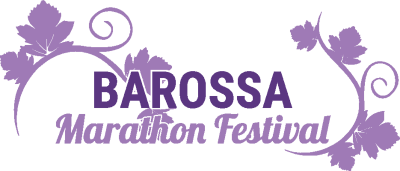2024 Barossa Marathon Festival Training plan instructions & notes
Updated by Kent Dredge - SARRC Club Coach. Copyright SARRC

General Information
We have created the attached programs to help develop your current running endurance level to complete either the 2024 Barossa Festival Half or Full Marathon. The 20 week programs follow a periodised schedule increasing the training loads gradually from week 1 with a reduction in volume every 3-4 weeks before further increases, to reduce the risk of injury, allow your body to recover and adapt to the training. In addition SARRC members can access a more detailed online program within finalsurge.com, by contacting the
Please choose the most appropriate program from one of the following, noting that Level 1 programs incorporate easier runs throughout the week & level 2/3 include weekly runs more focused on improving long term pace:
Barossa Half Marathon:
|
Download |
|
Download |
|
Download |
Barossa Marathon:
|
Download |
|
Download |
|
Download |
The plan should be used as a guide only, so feel free to switch days around to suit your own lifestyle, or substitute additional runs (e.g. Fartlek/Speed Intervals) on the cross training days or more experienced/busy runners may decide to undertake a level 2 or 3 program & reduce the weekly running commitment. Also feel free to substitute the type of run allocated in the program, e.g. a hill repeat session for a Fartlek/Speed Intervals session.
Please refer to workout descriptions below for further information on the sessions. Please contact
We also encourage you to join in with one of the many SARRC running groups (as detailed on the website), where you will find a supporting and social environment to keep you motivated towards your end goal. In particular the Sunday morning Marathon Mentor Group (7.30am start at our clubrooms on MacKinnon Parade, North Adelaide) will organise the appropriate distanced runs corresponding with these programs.
All programs also incorporate two strategies to assist with race day performance. The first being back-to-back runs scheduled for some weeks, which aims to improve your endurance by training your body to run in a fatigued state after a faster run the day before and therefore reduce the fatigue factor on race day. The second is a very short 15 minutes run with a few interval spurts the day before race day to ‘wake’ the body up and be prepared to race, as some people who have a complete rest day the day before comment on how lethargic they feel on race day. Once again, if you find these don’t work for you when you participate in the events earlier in the program, feel free to change to suit your needs or reach out to
Before you start any plan you should always have your own GOAL in mind, so don’t be concerned if others are running longer runs or more weekly kilometres than you, just remain focussed to the process.
My philosophy as a coach is that every training session should have a purpose, so it is important to focus on QUALITY, rather than the quantity. It’s nice to turn to your friends and say you did “x” kilometres for the week, but you need to also ask yourself how many of those kilometres were a waste of time and didn’t really contribute towards your overall GOAL. If occasionally you run an extra kilometre or 2 because you felt good (except maybe during the taper period) or run one less because you didn’t, it will not affect your overall achievement of the GOAL, always be mindful of injury RISK versus the REWARD.
Workout Descriptions
| Easy/Recovery Run |
Recovery session run at a comfortable pace (without a focus on the actual pace) that allows you to maintain a conversation with someone else. |
| Absorption Run |
A gentle run to absorb load to buffer the harder sessions while still building mileage that should not challenge the speed or endurance systems, e,g run at a controlled slower pace. |
| Hill Repeats |
Find a hill around 400m steep enough to be challenging, e.g. Montefiore Hill/Brougham Place, that you can still maintain good running form to the top. After a warm up period of around 10-15mins/2-3kms maintain a constant pace up the hill & recover back down & repeat. Start with 2-3 reps and aim to increase the reps to a total of 8-10 in subsequent attempts. Cool down for 10mins/2km. |
| Long Run |
Pace around 30 secs - 1 min/km slower than race day pace. |
| Race Pace |
The pace you aim to run on race day for the relevant distance. |
| Taper |
Training volume and intensity are reduced to allow some recovery prior to an event. |
| Tempo Run | A run at close to your 10km pace for half marathon’ers &marathon’ers A run at close to your 5km pace for 10km’ers Some run strategies you can incorporate to improve your tempo runs are (following a 1-2km warm up):
Make sure you also include a 1-2km cool down at the end of your session. |
| Speed Intervals | On intervals aim for less than 5km pace or quicker than your marathon pace for those running longer. Some alternative program examples:
4 x 1km - (or similar) The time you run for the 1km depends on your experience. The aim is to run all 4 at an even pace. So 4 x 5:30 for each KM with a 3 mins slow jog/shuffle between is better then splits of 4:55, 5:23, 6:01, 5:40. But if you did that, then next time try and run them all around 5:30? The more you do this session, the better you will get at it, and hopefully faster over the 1km with about the same effort over weeks. If you feel like you can't get any faster over the 1km, reduce the recovery time which makes the session harder too. 8 x 90 secs / 90 secs jog - (or similar) So how hard to go in the 90 secs? These sessions simple aim to force you to quicken your leg tempo / turnover. This pace should be faster than your 1km rep speed, but only just. Shorten your stride, lift your knees higher and use your forefoot more rather than heel striking. The technique is as important as the speed, and you'll probably go quicker as the session progresses and you stretch out and warm up properly. 200m hard/200m easy/400m Hard/400m easy/800m Hard/800m easy/1km hard/1km easy/800m Hard/800m easy/400m Hard/400m easy/200m hard/200m easy 30/20/10: 30 seconds of jogging, 20 seconds normal running pace, 10 seconds all out sprint immediately repeat cycle x4 (Total 5mins running) 2 mins jogging recovery Repeat x3 150m In-n- Outs: 5 sets x 150m: accelerate 1st 50m/ 2nd 50 faster than 1 km pace/ decelerate last 50 Jog or walk/jog or walk 250m to allow recovery (main focus is on the middle 50m) 10/20/30 increasing sprints: Drill 1: Sprint 6 x 10m recovery walk back to start. Complete 2 sets with 1 min rest between sets /Drill 2: 8 x Jog 10m, accelerate 10m (total 20m) recovery walk back to start & wait between reps. 1 min recovery at end of final rep /Drill 3: Sprint 6x 30m recovery walk back to start. Complete 2 sets with 1 min rest between sets Pyramid: 200m/400m/800m/400m/200m with 1 min recovery x 2 sets with 3 mins between sets |
| Strength & Conditioning (S&C) | Gym session, refer to additional information sheet for appropriate training. |
| Cross Training (XT) |
Non running day try swimming, cycling or walking for at least 30mins.. |
| Rest & Recovery |
Non running day have a massage, attend a yoga or Pilates class or dedicated stretching time |
| Fartlek |
Swedish word for speed play involves placing periodic surges into the run. After a warm up period of 5-10mins/1-2kms accelerate your pace for a period. of time (1-3 mins) or distance (100m-800m), then slow back down to an easy steady pace & repeat when fully recovered. Unlike Speed Intervals (or Mona Fartlek) there are no preconceived hard/easy sets, so you can have some fun and make it up as you go along, varying speed, distance & intensity. Try forgetting about the watch & sprint to the next stobie pole or next road, etc. Don’t forget to finish with a cool down period similar to your warm up period. |
| Mona Fartlek |
Australian word for Steve Moneghetti's Fartlek session, consisting of fixed times for your hard running and recovery running as follows; 2 x 90 secs hard/easy; 4 x 60 secs, 4 x 30 secs, 4 x 15 secs. Total time = 20.00mins |
General advice:
- There is only one you. How you feel while running, your pace, your recovery is all unique to you. So listen to what your body is telling you, not to anyone else.
- If you feel a sharp pain while running, stop and walk, stand still or sit down. Give yourself a check-up.
Stretch it out, walk it off or call it a day. Don't run through injury or sickness. Running is hard enough when healthy, and long breaks due to serious injury or illness are usually preventable. - Get into a routine if possible, as the body loves regularity when it comes to exercise.
- Never get down about not feeling like you aren't getting fitter or it's not getting easier, be patient and stick to the plan, because before you know it you will be reaching that finish line!
- Slow down your running pace if you have trouble breathing. Start off slow, finish strong. Smell the roses.
- Avoid sports drinks and consuming too many gels and bars. Eat a well balanced diet of fresh veggies and fruits and drink at least 2 litres of water a day when marathon training during summer.
- Drink water every 15- 20 mins during your long runs in summer too if possible.
- Practice your race day nutrition prior to race day to ensure your body can handle it.
Any further questions please email

